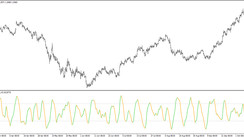Indeed, tracking your trading statistics is fascinating. Yet, these digits represent only a part of the broader narrative.
If you've found yourself stuck in a pattern of unidentified mistakes, it might be time to explore the benefits of a trading psychology journal.
Just as markets exhibit distinct behaviors, individual traders display recurring responses and behavioral tendencies. Unfortunately, these personal patterns often go unnoticed, even though they could significantly impact our trading success.
Throughout our lives, we develop coping strategies to handle stress.
Take this as an example: Your first leap into a pool taught you that the water can be shockingly cold. To avoid this discomfort, you learned to test the temperature with your toes before diving in.
These coping mechanisms gradually become habits and instinctively activate when we encounter similar situations.
While these reflexive responses are developed subconsciously to protect us from discomfort, they can sometimes lead us to make rash or poor trading decisions.
How often have you prematurely exited a winning trade when the market marginally turned against you? Chances are, you've chastised yourself for this repeated behavior, especially when you knew that sticking to your plan could've resulted in a more substantial profit.
Herein lies the value of a trading psychology journal. It serves as an instrument to identify your behavioral patterns.
If you're contemplating how to begin, here are a few pointers:
Characterize the Current Market State
Start by delineating the current market scenario and justify why your trading setup could flourish in that specific environment. Consider what's unfolding in the forex market and why you believe your trade will move in your intended direction. Ponder over the dominant themes in the market, the risk involved in the proposed trade, the alignment of your trades with your risk management strategy, and the appropriateness of your risk-reward ratio.
Jot Down Essential Notes
Consider looking at the economic calendar and jotting down all important events to follow in the forex market on the same trading day or week. Note down profitable strategies or technical analysis indicators that pique your interest.
If you're trading stocks, note down the stocks and significant events you want to track in the stock market.
Reflect on Your State of Mind
Having covered the forex or stock market situation and your trade direction rationale, turn inward and examine your emotional state. While it might feel odd to document your emotions initially, it's crucial in understanding trading psychology and crafting an optimal trading process.
No detail is too minor when it comes to factors influencing your mood. Write down everything that could potentially impact your decision-making, even if it seems trivial.

Record the Results
Note the outcomes of your trading decisions to understand the positive or negative influence of emotions. To identify potential problems, ask:
Did impatience prompt you to close your trade prematurely? Was concentrating difficult, and why? Did you push your stops further due to an overwhelming desire for success? Did overconfidence cause you to enlarge your position size?
The goal is to recognize behavioral patterns and their typical outcomes. This understanding will help you identify situations that adversely affect your decision-making and choose to abstain from trading when these patterns resurface.
In due course, you will develop a keen awareness of these behavioral patterns, pinpoint what triggers your stress, and prevent these situations from harming your trading portfolio.
Finally, remember to note the outcomes of all your trades to ascertain the emotions that have influenced your trades, whether positively or negatively. That's the essence of a trading journal.
Successful trading in the financial markets demands a diverse skill set. Traders must be capable of appraising a company's underlying value and predicting the course of a stock's trajectory. However, these technical competencies pale in significance when compared to the mental acuity of the trader.
The essential components of what we could term 'trading psychology' involve controlling emotional reactions, agile thinking, and exercising self-discipline.
Two primary emotions that traders must comprehend and manage are fear and greed.
Quick Thinking and Rapid Decisions
Traders often need to be sharp-witted and decisive, swooping into and out of stocks at a moment's notice. Achieving this requires a unique mental clarity and self-control to adhere to their pre-set trading strategies, knowing precisely when to secure profits and cut losses. Emotions must not obstruct the path.
Frequently, market performance defies the fundamentals, driven instead by the collective sentiment of investors. Successful investors master their fear and greed—the two critical emotions that fuel this sentiment. Realizing this gives you the discipline and impartiality needed to capitalize on the emotional responses of others.
Establishing Guidelines
A trader's success often hinges on their ability to formulate rules and adhere to them when emotions run high. Outline guidelines according to your risk-reward tolerance to determine when to engage in a trade and when to exit. Implement a profit target and establish a stop loss to remove emotional interference from the process.
You might also choose specific events, such as positive or negative earnings reports, as triggers to buy or sell a stock.
Establishing daily limits on the maximum amount you are willing to win or lose is a wise strategy. If you reach your profit target, secure your gains and walk away. Conversely, if your losses reach a predetermined threshold, stop trading and retreat. Either way, there will always be another trading opportunity waiting for you.
Remaining Adaptable
Maintaining flexibility is crucial for traders, and occasional experimentation can be beneficial. For instance, consider employing options as a risk mitigation strategy. Experimentation (within reasonable bounds) is one of the most effective ways a trader can learn and it may also help reduce emotional influences.
Lastly, it's important for traders to periodically evaluate their performance. Apart from reviewing their returns and individual positions, traders should contemplate how they prepared for a trading session, their current knowledge of the markets, and their progress in ongoing education. This regular self-assessment can help traders rectify mistakes, eliminate bad habits, and improve overall returns.
A Trader's Journal: More than Just Numbers
No successful trading career can be envisaged without a solid trading plan. To consistently realize winning trades and become a profitable trader, you must know your plan, goals, and process. The right mindset is crucial to your trading success.
While a basic trading journal could simply log the number of trades and profit & loss directly extracted from a trading account, some traders might want to expand their journal's scope. Consider recording market conditions, investment needs, financial conditions, trading goals, trading psychology, feelings, emotions, a trading plan, reasons for losing money in trading, to-do and not-to-do lists, etc. Ultimately, all traders, particularly beginners, are encouraged to maintain a trading journal to monitor their overall performance. In the end, it will assist you in crafting a trading plan and propelling you towards success as a trader.





